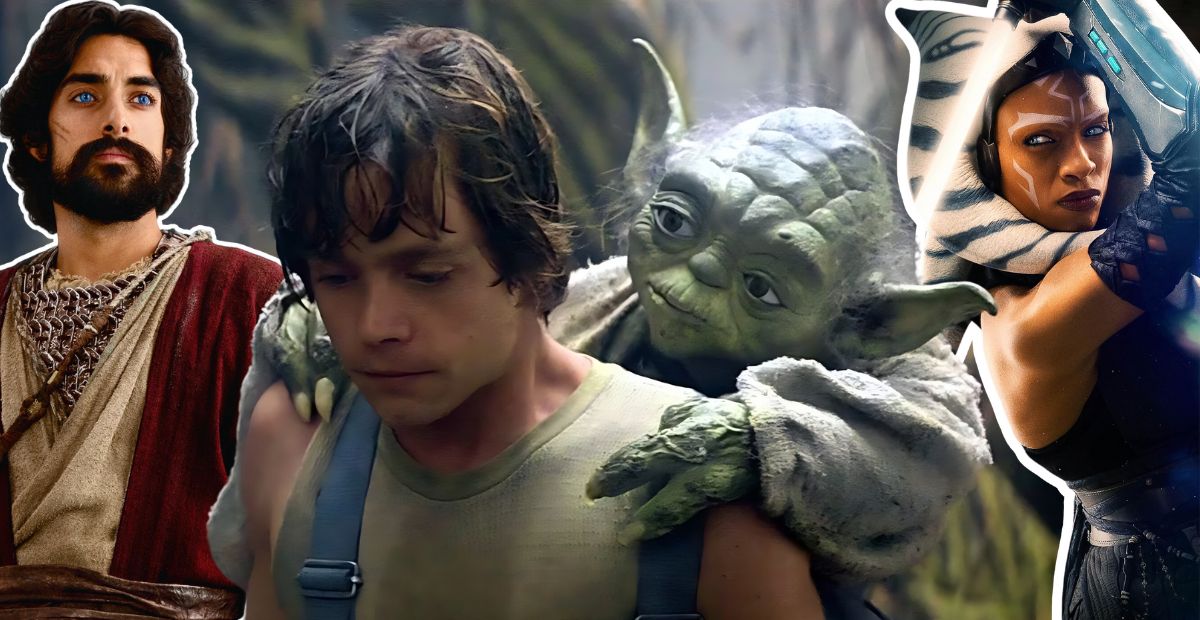After Order 66, only a handful of Jedi survived—among them were Ahsoka Tano, Kanan Jarrus, and others we later come to know, like Cal Kestis from Jedi: Fallen Order and Gungi, the Wookiee youngling from The Clone Wars.
However, in Yoda’s eyes, none of them were considered true Jedi.
In Star Wars: Episode VI – Return of the Jedi, Yoda tells Luke Skywalker that he will be the last Jedi after Yoda’s death. He says, “Luke, when gone am I, the last of the Jedi will you be.”
But why is that? Even though there are still individuals like Ahsoka and Ezra, why does Yoda only consider Luke as the last Jedi?
The Young Jedi Who Weren’t Trained in the Jedi Way
The only known Jedi Padawan after Order 66 was Ezra Bridger, who was trained by his Jedi Master, Kanan Jarrus. However, Ezra becoming Kanan’s Padawan wasn’t under the official Jedi Order.
We know that when the Jedi Order wanted to recruit younglings, they had to pass a test using the Force to identify images from a handheld machine, like Anakin did when he first stood before the Jedi Council. But Ezra didn’t take the Jedi Initiate test when he was accepted by Kanan.
Additionally, there are indications that Yoda might not have fully accepted Ezra as a Jedi. That’s part of why some Jedi Masters, especially Yoda, might not have fully recognized Ezra as a true Jedi. In Star Wars Rebels, when Ezra reaches out to Yoda for guidance through the Force, the conversation is cryptic. Yoda speaks in metaphors, offering wisdom that Ezra struggles to fully grasp. It’s a quiet moment, but it hints at Yoda’s uncertainty—perhaps even skepticism—about Ezra’s place in the Jedi legacy.
This sentiment ties into a term later introduced in Ahsoka: “Bokken Jedi.” Baylan Skoll, a former Jedi himself, uses it to describe Force users like Ezra who were trained outside the Order after its fall. To Baylan, they were Jedi in name only—shadows of the old ways, with none of the structure or trials that once defined the title. It’s a harsh view, but one that Yoda may have quietly shared.
Ahsoka Tano also fits into this category. Although once a Padawan of Anakin Skywalker, she made the choice to leave the Jedi Order behind. Even when she continued to fight for the light, she did so as an independent, no longer bound to the Council or the Code. It’s no surprise, then, that Yoda wouldn’t consider her part of the Jedi by the time of Return of the Jedi.
For Yoda, being a Jedi wasn’t just about using the Force or wielding a lightsaber. It was about walking the narrow path of discipline, humility, and trials. And by those standards, only Luke—who confronted Vader and passed the Jedi Trial Yoda set for him—was seen as the last true Jedi.
Why Yoda Considers Luke the Last Jedi
Yoda’s training of Luke Skywalker on Dagobah wasn’t just about teaching Force abilities or combat skills—it was about shaping Luke into what Yoda believed a true Jedi should be. For Yoda, the Jedi path wasn’t about power or victory, but about discipline, clarity, and a deep commitment to the Jedi Code.
That’s what made Luke different from the others still out in the galaxy. While survivors like Ahsoka or Kanan had followed their own paths after the fall of the Order, Luke was trained with purpose—to restore what the Jedi once stood for.
Yoda focused Luke’s training on mastering emotions and letting go of attachments. Fear, anger, and hate—the emotions that led Anakin to fall—were things Yoda warned Luke against repeatedly. The line “Fear leads to anger, anger leads to hate, hate leads to suffering” wasn’t just a warning. It was the foundation of Jedi discipline.
And perhaps no moment summed up Yoda’s teaching better than when he told Luke: “Do, or do not. There is no try.”
That simple line wasn’t just a motivational quote—it reflected the Jedi’s belief in certainty, focus, and inner balance.
By the time Luke faced Darth Vader and the Emperor, he was no longer just a student. He had walked the path of temptation, faced the darkness, and turned away. That was his trial. And to Yoda, passing that trial is what made someone a Jedi—not their training, not their master, not a title.
So when Yoda said, “When gone am I, the last of the Jedi will you be,” he wasn’t ignoring the existence of others like Ezra or Ahsoka. He was saying that Luke was the only one who walked the old path, faced the trial, and upheld the Jedi way until the very end.

